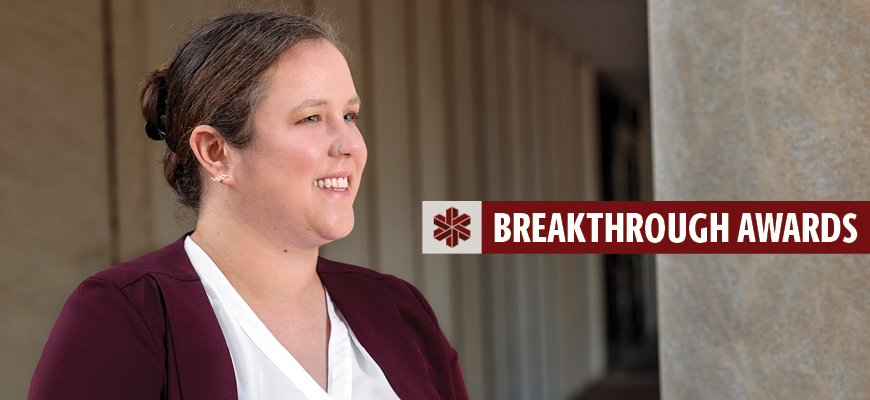
Breakthrough Star: Katelyn Stauffer
Political science professor researches gender, power in America
Posted on: July 21, 2022; Updated on: July 21, 2022
By Megan Sexton, msexton@mailbox.sc.edu, 803-777-1421
Katelyn Stauffer, an assistant professor of political science, studies how gender shapes American political behavior and what it means to have women in positions of power.
It’s a topic of particular interest in today’s political climate. And it’s a field she came to almost by accident.
Stauffer was always interested in politics and political history, and she majored in political science as an undergraduate at Gettysburg College, a small, liberal arts school in her native Pennsylvania. In her junior year, the class she planned to take in electoral politics was full, so she ended up in a course on women in politics, something she wasn’t particularly interested in, but it fit in her schedule.
It was that class that would set her on the path to her field of research, and it included an assignment interviewing most of the women serving in the Pennsylvania state legislature.
“I ended up just really loving the topics and the discussions that we would get into in that class. And then I ended up working with that professor doing research, and she's actually the one who said to me, ‘Have you thought about grad school? You seem like you really like this and you seem like you're pretty good at it. You should think about it.’ And so that's kind of what led to the decision to get a Ph.D. And I stuck with women in politics from then on.”
I think anytime you have women break into these really high-profile positions, it's a good thing. I think we're going to have to see what happens in the next few election cycles, whether there's going to be a backlash to that or whether we're going to see institutions really supporting women and elevating them to positions where they could hold those spots again.
Katelyn Stauffer
She earned her Ph.D. from Indiana University and arrived at the University of South Carolina in 2018, where she teaches courses on gender and politics, political representation and legislative politics. Her work comes at a time when women serve at higher numbers nationally in elected office, including as vice president and speaker of the U.S. House of Representatives.
“I think anytime you have women break into these really high-profile positions, it's a good thing. I think we're going to have to see what happens in the next few election cycles, whether there's going to be a backlash to that or whether we're going to see institutions really supporting women and elevating them to positions where they could hold those spots again,” Stauffer says. “There's a lot of research that talks about role models and what it means for other women to see women holding positions of power and how that could encourage them to be engaged and involved themselves.”
Her research at UofSC looks at two overarching questions that focus on the meaning and consequences of women in positions of power. She studies what it means for the public to see women serving as elected officials, and how women act when they are in positions of power, including non-elected positions such as police officers, lobbyists and law clerks.
And what has she learned?
“One thing that comes out of my research is that people actually are pretty uninformed about women's representation in office. And yet when you ask them to think about it and to think through the picture of a legislature, they like one that they think has women,” she says.
On another of her research areas looking at women who work as police officers, her findings indicate “women may be better at the job.”
“My work right now has been primarily focused on looking at traffic stops. What we've found there is women search cars a lot less when they pull them over. But if you look at illegal contraband, women (officers) are finding just as much as men. What we can take from that is basically they're doing a lot fewer needless searches.”